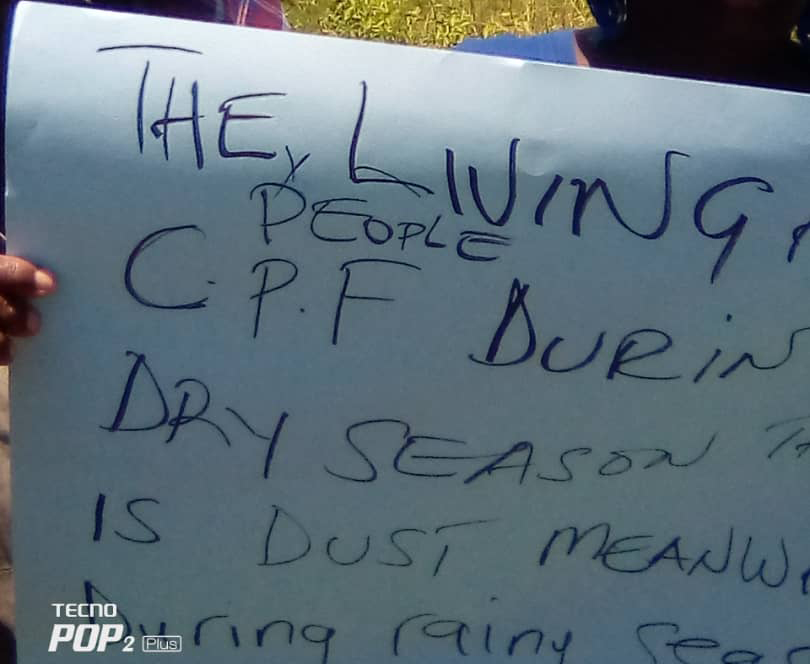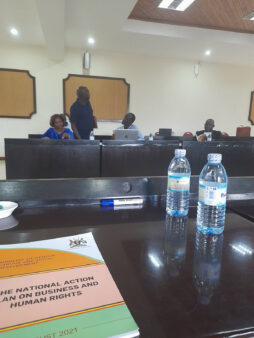Households living near TotalEnergies’ Industrial Area in Buliisa district have protested against failure by TotalEnergies, and its sub-contractor MontaEngil, to mitigate the Tilenga oil project impacts on them.
The Industrial Area is being developed in Kasinyi village, Ngwendo sub-county. It will host a Central Processing Facility (CPF) among other oil infrastructure under TotalEnergies’ Tilenga oil project.
In 2021, TotalEnergies sub-contracted MontaEngil to undertake site preparation works such as site clearance, fencing and drainage works in the Industrial Area. Communities say that they have suffered many impacts since MontaEngil started work.
“During the dry season early this year, dust from the CPF area was too much. The dust affected children the most. Some developed asthma while others suffered from flu. Communities especially women suffered with taking children to hospital and paying for medicine yet families have little money. It was also hard for them to dry their cassava -their staple food- amidst the dusty conditions,” Comfert Aganyira, Africa Institute for Energy Governance’s Bunyoro region Field Officer, says.
Today, with the rainy season having commenced, the communities are suffering from flooding, and its attendant destruction.
“Water specifically comes from the CPF area and it goes to our gardens. The water is too much! It has destroyed crops belonging to several families, including mine,” Jelousy Mugisha, a resident of Kasinyi village who is also the chairperson of the Resettlement Planning Committee (RPC) for the Industrial Area, says.
The RPC is a committee of local leaders that TotalEnergies put in place to enable community participation in the compulsory land acquisition processes for the Tilenga Industrial Area. The RPC is dormant at the moment, despite communities decrying the Industrial Area’s impacts on them.
Mugisha adds, “My watermelon, grafted orange and jackfruit trees were destroyed by the water from the CPF. After the destruction, I wrote a letter to the General Manager of TotalEnergies on August 2, 2022. Through the office of the L.C.1 chairperson, other households also wrote a letter to TotalEnergies’ General Manager on August 4, 2022,” Mr. Mugisha says.
He adds, “A Community Liaison Officer (CLO) from Total came about a week after receiving my letter. He assessed the damage and said that he would come again. On August 13, 2022, three CLOs from TotalEnergies came with Ministry of Energy and Petroleum Authority of Uganda [PAU] representatives. PAU advised TotalEnergies to assess the damage done and pay us. Nothing happened.”
Mr. Maxwell Atuhura of Tasha Research Africa from Buliisa district says, “When no action was taken by Total, the angry communities blocked roads in the night about six days ago. No action was taken after that protest. The community is unhappy and shall not sleep when injustices are committed against them. They say that they shall continue to fight for their rights. This is why they organised yesterday’s protest.”
Dickens Kamugisha, the CEO of Africa Institute for Energy Governance says, “Experts and civil society groups have been telling the Ugandan government that TotalEnergies’ mitigation measures as contained in the Tilenga project’s Environmental and Social Impact Assessment [ESIA] report are inadequate.
Government has not listened because they are determined to produce oil. Today, we see that mere site preparation works in Ngwendo-Buliisa are causing huge impacts. What will happen when laying of pipes in national parks, drilling for oil and other major oil activities commence? Will communities and biodiversity survive?”
Biodiversity and other impacts such as destruction of canopies, increased human-wildlife conflicts and killing of animals by motorists among others have been seen within and outside Murchison Falls National Park (MNFP) due to ongoing oil-related activities.
Climate change impacts have also impacted oil activities with oil wells being submerged. Experts say that the potential climate change impacts were not adequately assessed in the Tilenga ESIA, which was approved by the National Environment Management Authority (NEMA) in 2019. The proposed climate change mitigation measures in the ESIA are also inadequate, which could explain why there is poor management of the impacts.
The Tilenga Industrial Area host communities are calling on TotalEnergies to work with MontaEngil to address their project’s impacts on them. They are also calling on the High Court of Uganda to urgently hear and conclude the case of 2019 challenging the legality of the Tilenga ESIA certificate of approval that was issued by NEMA to TotalEnergies. The communities feel that it is an injustice for court to delay concluding the case for four years while they are going through untold suffering.
“We are poor farmers. A rich company should not come to our lands and make us sick, poorer and food insecure. Total should come on the ground, assess the damage done to our crops and compensate us immediately,” the affected people say.
Government should also stop the ongoing oil project activities until courts pronounce themselves on court cases that were filed by AFIEGO and our partners in Uganda, the East African Court of Justice (EACJ) and France. Among others, the applicants through the court cases argue that TotalEnergies did not put in place adequate mitigation measures to address its Tilenga project impacts. Courts are supposed to compel TotalEnergies to put in place adequate measures.

 Centenary Group and Service Cops Sign Strategic Partnership to Accelerate Digital Financial Inclusion
Centenary Group and Service Cops Sign Strategic Partnership to Accelerate Digital Financial Inclusion


